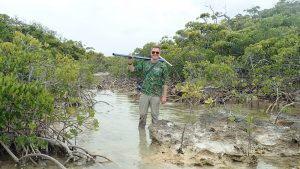Assoc Prof Dan Friess: Saving our mangroves for planet-saving payoffs
August 2, 2021

In ‘Saving our mangroves for planet-saving payoffs’ (NUS News, 26 July 2021), Associate Professor Daniel Friess (NUS Department of Geography) spoke to NUS News about his work in mangrove research and conservation. As a coastal geographer, A/P Friess is passionate about mangrove forests beyond them being simply a topic of academic interest. Not only is he the Deputy Director of the NUS Centre for Nature-based Climate Solutions, A/P Friess also holds the position of Deputy Director of the NUS Bachelor of Environmental Studies programme and is a member of the International Union for Conservation of Nature Mangrove Specialist Group.
The impact that mangroves have on coastal communities is immeasurable. Though the area which mangroves cover is not huge, mangroves are able to make a small but meaningful contribution to mitigating climate change, as they are able to store carbon more efficiently than other forests. They also play an important part in coastal defence, because they can trap floating sediment to allow the surface of mangroves to rise at the same rate as the sea level, and use its roots to act as a barrier against incoming waves. Research on mangroves thus has a real chance of directly improving the lives of people if translated into on-the-ground and policy actions.
A/P Friess also mentioned that mangroves are difficult to restore once they are lost. This is because mangrove restoration requires more than just the planting of mangrove trees, but also the altering of physical environments so that they would be in an optimal condition for mangroves to grow. Therefore, it would be much more cost-effective to protect the mangroves that already exist now, rather than try to replace those that have been lost later on.
The global mangrove deforestation rates have reduced from three percent to approximately 0.1 percent per year. However, A/P Friess argues that there is still more that can be done, as commodity production continues to cause mangrove loss in the region. In Singapore, actions by policymakers and community groups such as the Restore Ubin Mangroves Initiative have been made to further protect our mangroves as well. With no contribution being too small, A/P Friess mentioned that anyone who wishes to help conserve our mangroves can volunteer with community groups to get involved in nature walks, biodiversity surveys, or any mangrove cleanups that are organized in Singapore.
Read the article here.
